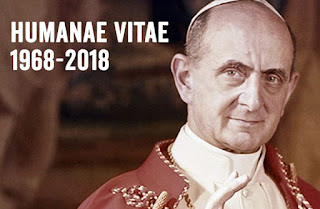Humanae Vitae was a
prophetic document when it was published 50 years ago. I give you Paragraph 17:
Responsible men can
become more deeply convinced of the truth of the doctrine laid down by the
Church on this issue if they reflect on the consequences of methods and
plans for artificial birth control. Let them first consider how easily this
course of action could open wide the way for marital infidelity and a
general lowering of moral standards. Not much experience is needed to be
fully aware of human weakness and to understand that human beings—and
especially the young, who are so exposed to temptation—need incentives to keep
the moral law, and it is an evil thing to make it easy for them to break that
law. Another effect that gives cause for alarm is that a man who grows
accustomed to the use of contraceptive methods may forget the reverence due
to a woman, and, disregarding her physical and emotional equilibrium,
reduce her to being a mere instrument for the satisfaction of his own desires,
no longer considering her as his partner whom he should surround with care and
affection.
Finally, careful
consideration should be given to the danger of this power passing into the
hands of those public authorities who care little for the precepts of the moral
law. Who will blame a government which in its attempt to resolve the
problems affecting an entire country resorts to the same measures as are
regarded as lawful by married people in the solution of a particular family
difficulty? Who will prevent public authorities from favoring those
contraceptive methods which they consider more effective? Should they regard
this as necessary, they may even impose their use on everyone. It could well
happen, therefore, that when people, either individually or in family or social
life, experience the inherent difficulties of the divine law and are determined
to avoid them, they may give into the hands of public authorities the power
to intervene in the most personal and intimate responsibility of husband and
wife.
Consequently, unless
we are willing that the responsibility of procreating life should be left to
the arbitrary decision of men, we must accept that there are certain
limits, beyond which it is wrong to go, to the power of man over his own body
and its natural functions—limits, let it be said, which no one, whether as a
private individual or as a public authority, can lawfully exceed. These limits
are expressly imposed because of the reverence due to the whole human organism
and its natural functions, in the light of the principles we stated earlier,
and in accordance with a correct understanding of the "principle of
totality" enunciated by Our predecessor Pope Pius XII.
Infidelity I
think it is obvious that more people are getting divorced today than they did
back when birth control first began to become legal in the middle of the last
century.
Lack of reverence for women There has definitely been an increase in
reports of sexual abuse and sexual assault since legal birth control came
about. The aforementioned infidelity is
another sign of disrespect for women when the man leaves his wife, which
happens more frequently now.
Abuse of power There has definitely been an increase, especially in the later part of the
20th century, in government enforced limits on number of children,
which utilizes enforced abortion, and sterilization to achieve its ends. (See my series on population control entitled
“Be Fruitful and Multiply” for more information, especially this section
here:
Unlimited Dominion
We now think we can do
whatever we want with our bodies; this includes abort the child inside it, end
its vitality whenever we want (euthanasia) alter it to change our gender, sterilize, drug
it up, the list goes on. There are
dangers when man thinks there are no limits to what he or she can do with his or her body.
We no longer realize our bodies, and that includes our
reproductive organs, are gifts from God and that we are called to be good
stewards of them. Let us heed the
warnings of Pope Paul VI, and see our bodies as they truly are “temples
of the Holy Spirit.” (1 Corinthians 6:19). (For more on the glorious creation that is
our body, see my post here:
This encyclical was truly prophetic. But as I stated in the first post in this
series, it possibly could have been a richer document. There is a slight chance it may have been
received differently than it was if it had been supplemented with more appeals
to Scripture and Tradition. I will discuss that in a little more detail in
the last post of this series.






